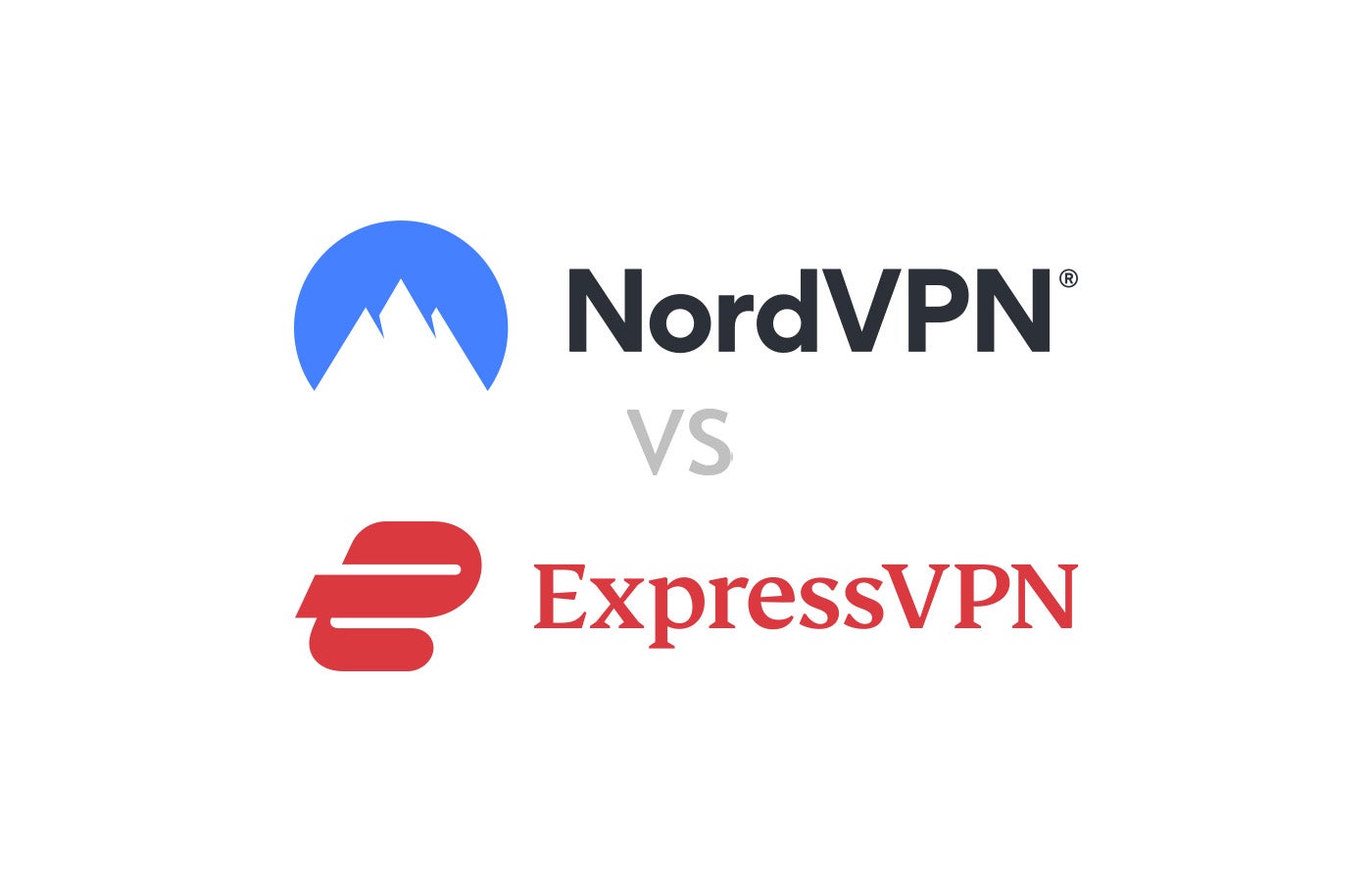NordVPN and ExpressVPN both sit at the top of the food chain when it comes to modern VPN providers. Both VPNs are known for fast speeds, large server suites, and a strong reputation for quality. However, there are key differences between the two.
NordVPN comes with impressive security and privacy-focused features, such as its Meshnet encrypted file-sharing system and Threat Protection against malware and ads. Meanwhile, ExpressVPN has a clean and easy-to-use interface and an impressive portfolio of third-party security audits.
In this article, we figure out which VPN is best for you and your business.
- NordVPN: Best for most users that want a large server network and a variety of extra security features.
- ExpressVPN: Best for users that prioritize having a user-friendly interface and fast VPN download and upload speeds.
NordVPN vs ExpressVPN: Comparison Table
| NordVPN | ExpressVPN | |
|---|---|---|
| Our rating | 4.7 out of 5 stars | 4.6 out of 5 stars |
| Security protocols | OpenVPN, NordLynx (based on WireGuard) | OpenVPN, Lightway |
| No. of servers | 6,200+ | 3,000 (reported) |
| VPN server locations | 111 countries | 105 countries |
| Simultaneous device locations | 10 | 8 |
| Supported platforms | Windows, macOS, Linux, Android, iOS, Chrome, Firefox, Edge, Android TV, Apple TV, routers, game consoles | Windows, macOS, Linux, Android, iOS, Chromebook, Chrome, Firefox, Vivaldi, Brave, Edge, Amazon Fire tablet, routers, media consoles, game consoles |
| Free trial | 7-day free trial via Android (can sign in on other platforms afterwards) | 7-day free trial for iOS and Android only |
| Starting price (annual plan |
$4.99 per month | $6.67 per month |
NordVPN and ExpressVPN: Pricing
NordVPN pricing
NordVPN’s paid plans have three subscription tiers, namely NordVPN Basic, Plus, and Ultimate. Take note, I noticed that in some regions, NordVPN Ultimate will sometimes be called NordVPN Complete or Ultra. This means the top plan may be different depending on your location.
Below is an overview of pricing and feature differences with each tier:
| Basic | Plus | Ultimate | |
|---|---|---|---|
| Monthly | $12.99 per month | $13.99 per month | $15.99 per month |
| 1 year | $4.99 per month | $5.99 per month | $7.99 per month |
| 2 years | $3.09 per month | $3.99 per month | $5.99 per month |
| Features | Main VPN service | All Basic features plus Threat Protection against ads, malware, and trackers; access to NordPass password manager; data breach scanning capabilities |
All Plus features plus 1TB encrypted cloud storage; identity threat recovery; cyber extortion protection |
Out of NordVPN’s plans, I feel its Plus subscription for one year brings the best value. It provides a good balance between a reasonable monthly fee while having a healthy amount of NordVPN’s additional security features. Among these are its Threat Protection feature that protects against malware and ads, as well as its data breach scanner.
SEE: The Top 7 NordVPN Alternatives for 2024 (TechRepublic)
Meanwhile, I commend NordVPN for including Nord Security’s dedicated password manager, NordPass, to its Plus subscription tier. This is essentially a second service on top of the main VPN — all in a single subscription. To me, this is a meaningful value-add, especially for users that are also in the market for a password manager.
While NordVPN doesn’t currently have a free version, it has a seven-day free trial via Android. Once you sign up for the trial, you’ll be able to try NordVPN on desktop as well. While I laud Nord for offering a trial, I hope it opens this up for iOS users as well. This would allow more users to try and test NordVPN out.
Fortunately, NordVPN has a 30-day money-back guarantee for all its paid subscriptions. With this, you can pay for an initial plan and request a refund if you find it isn’t the right fit. Just make sure to request the refund within the allotted time period.
If you want to learn more, read our full NordVPN review.
ExpressVPN pricing
Compared to NordVPN, ExpressVPN has more straightforward pricing that’s only divided depending on contract length.
- 1 month: $12.95 per month.
- 6 months: $9.99 per month.
- 1 year: $6.67 per month.
As a consumer, I like this approach since it simplifies the whole buying process. However, this does mean that ExpressVPN carries less feature packages compared to NordVPN — a topic we’ll discuss more in-depth later.
SEE: CyberGhost vs ExpressVPN (2024): Which VPN Is Better? (TechRepublic)
Coincidentally, ExpressVPN also includes its own password manager, ExpressVPN Keys, to its paid subscriptions. While I find NordPass to be the more powerful password manager, I’m still happy that ExpressVPN bundles it with all the paid plans.
Like NordVPN, ExpressVPN offers a 30-day money-back guarantee on all paid plan options. While ExpressVPN also has a seven-day free trial, this is only available for its mobile apps on Android and iOS.
If you want to learn more, read our full ExpressVPN review.
NordVPN vs ExpressVPN: Feature comparison
Security protocols and encryption
Winner: Tie
Both NordVPN and ExpressVPN provide top-tier encryption and quality VPN protocols. In both services, we get the industry standard AES-256 encryption algorithm — well recognized as one of the most secure algorithms available.
SEE: NordVPN vs Proton VPN (2024): Which VPN Should You Choose? (TechRepublic)
For VPN protocols, NordVPN carries OpenVPN and its proprietary NordLynx protocol based on the speed-oriented WireGuard. On the flipside, ExpressVPN also offers the OpenVPN protocol and its own Lightway protocol, similarly built for speed.
I appreciate how, for both NordVPN and ExpressVPN, users have the option to choose from a security-focused protocol or one that provides more speed. For context, OpenVPN is known for its security as an open source protocol, while WireGuard is faster and more modern.
In this way, you get the best of both worlds and aren’t confined to just prioritizing security or speed. With this, both NordVPN and ExpressVPN hit the mark for their security protocols and encryption.
VPN server network and locations
Winner: NordVPN
When taking a look at their respective VPN server networks, I have to give NordVPN the win. As of September 2024, NordVPN currently has 6,200+ servers across 111 countries. On the other hand, ExperssVPN has servers spread across 105 countries. While ExpressVPN doesn’t explicitly provide a server number, reports have pegged its server fleet at around 3,000+ servers.
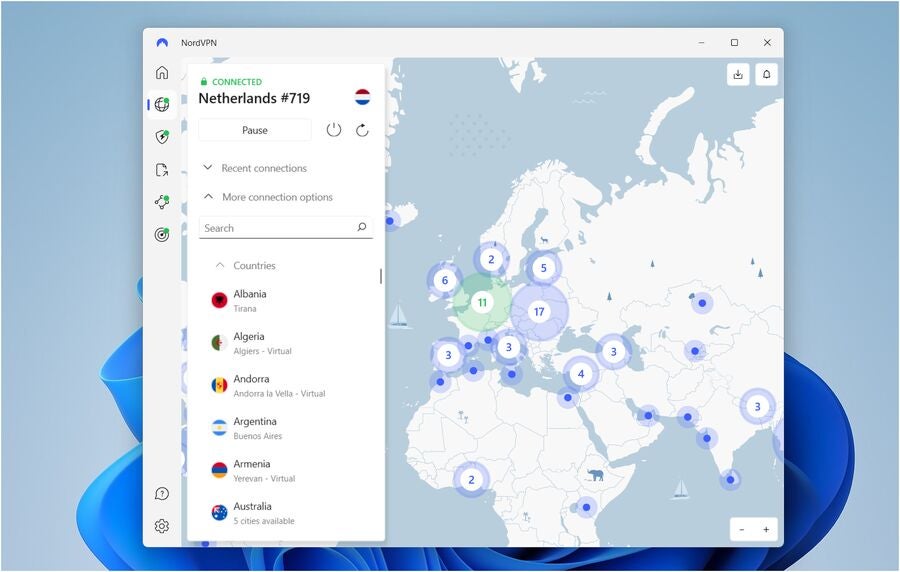
The more important number to consider here is the server countries or locations. At 111 countries, NordVPN has six additional locations over ExpressVPN’s server fleet. This means you get slightly more choice in terms of IP locations with NordVPN — something I know will benefit those that plan to primarily use VPNs to unblock region-locked online content.
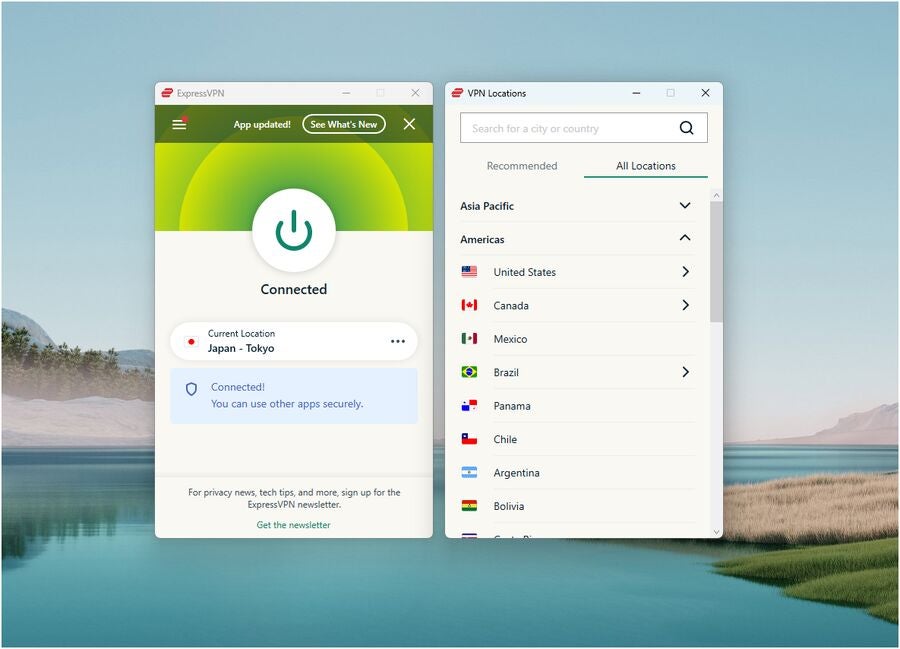
To be fair, ExpressVPN’s 105-country server suite also offers an extensive range of country options. It just so happens that NordVPN gets the slight advantage over ExpressVPN, with its more robust server fleet and country selection.
SEE: Does a VPN Slow Down Your Internet Speed? (TechRepublic)
As a side note, I highly recommend checking both NordVPN and ExperssVPN’s official server pages to see whether the location you need for unblocking is available. Luckily, both providers regularly update which VPN server locations they have on offer.
Third-party audits and track record
Winner: ExpressVPN
If you’re looking for a VPN with a strong portfolio of third-party audits, I recommend going for ExpressVPN. Since 2018, ExpressVPN has completed a total of 18 independent security audits. That’s very impressive, especially considering how other VPNs outright don’t have their services tested independently. These audits have looked into various aspects of ExpressVPN, from its no-logs policy to its desktop applications. Its most recent audit was published just last June 2024 for the ExpressVPN browser extension.
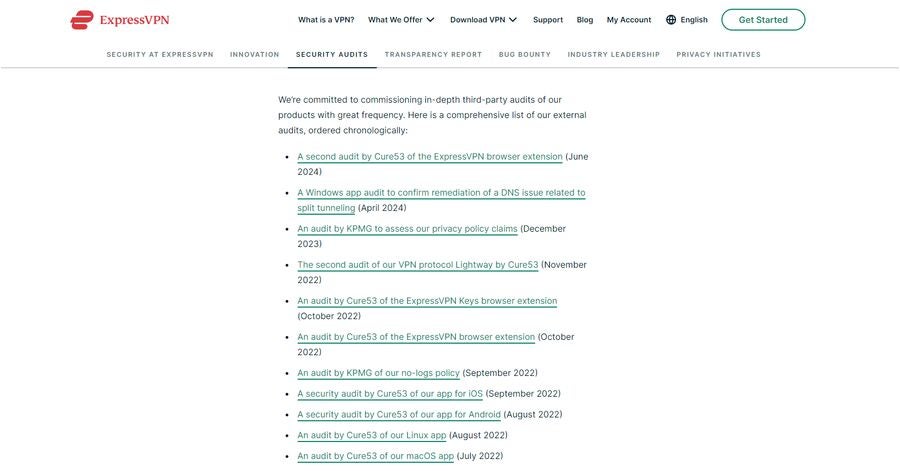
As VPNs deal with sensitive info like our browsing data and online activity, I find third-party audits to be essential considerations. They provide users with more than just a company’s promises or claims. In this respect, ExpressVPN gets high marks from me with its consistent and strong commitment to third-party testing.
SEE: It is safe to use SSLVPN services like NordVPN? (TechRepublic Forums)
On the flipside, NordVPN has had four independent audits of its no-logs policy since 2018. Its latest audit was conducted by Deloitte Audit Lithuania in late 2023, also on its no-logs policy.
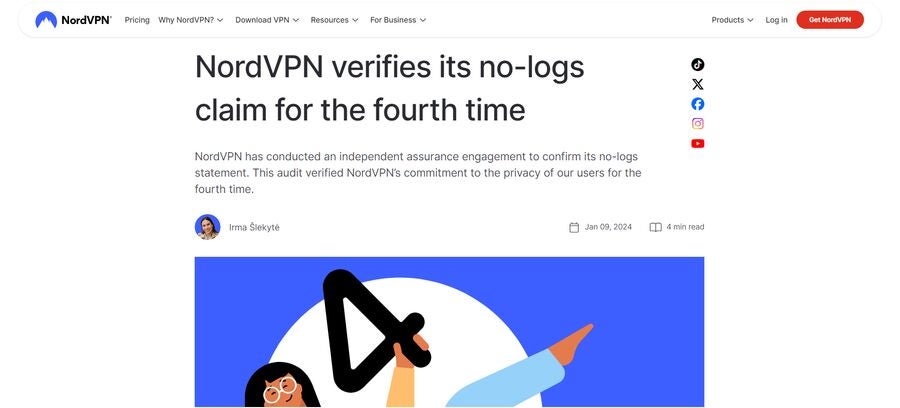
Curiously, the latest audit results are only available for active NordVPN users and not to the public. Nord says this “ensures the audit results are not taken out of context or misunderstood.” While I can see where NordVPN is coming from, I think the more consumer-friendly approach is to make audit results publicly available — regardless of the findings.
Nonetheless, I think both VPNs do a good job of having their applications independently tested. It just so happens that ExpressVPN is the clear winner in this regard, especially with its hefty portfolio of audits to date.
Standout features
Winner: NordVPN
For users that want a suite of extra features, I suggest going for NordVPN. It has a ton of security-focused capabilities that add meaningful value alongside the main VPN.
My favorite among them was NordVPN’s Meshnet private network system. It lets users share files or access devices remotely via an encrypted connection — a feature I envision to be useful when sharing sensitive files or documents.
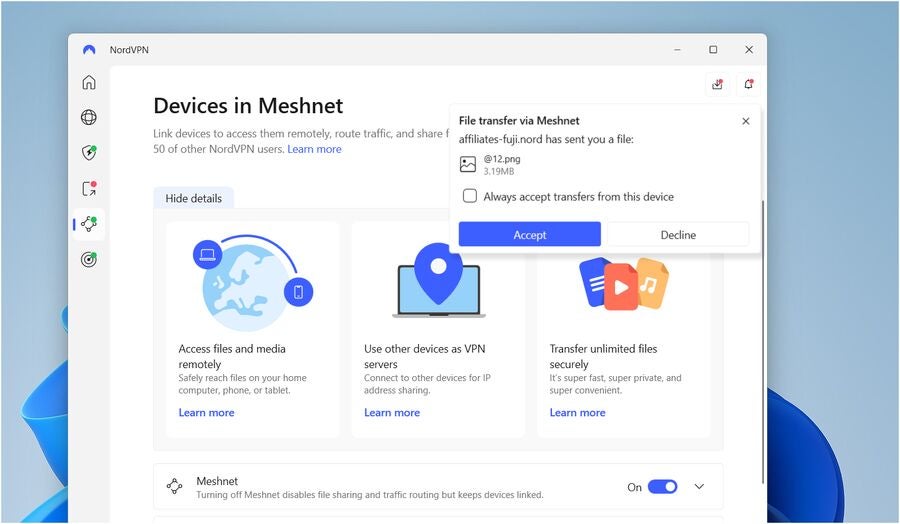
It also has its Threat Protection Pro web and file protection feature that blocks against intrusive ads, malware, and trackers. This keeps an active count of all threats blocked by NordVPN. Aside from these, NordVPN includes a dark web monitor, double VPN servers, Onion Over VPN capabilities, and obfuscated servers, among other features.
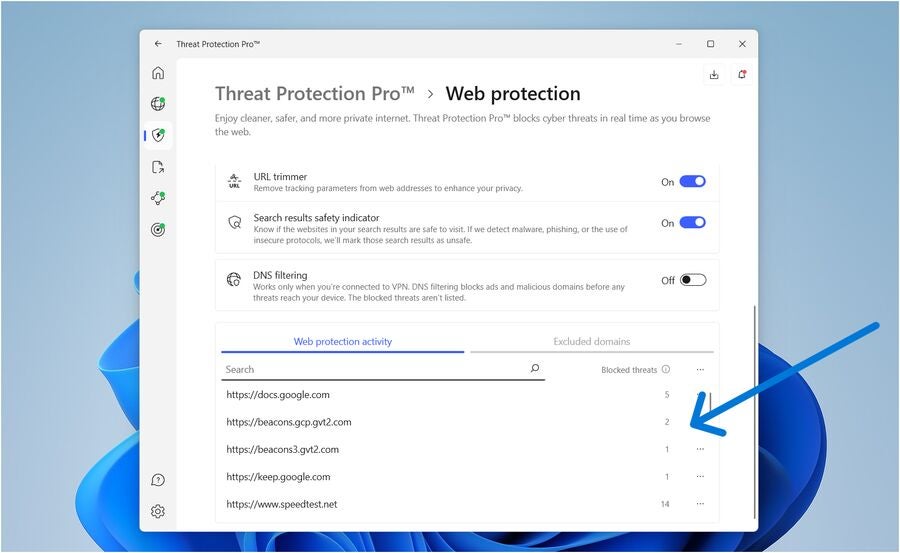
That isn’t to say ExpressVPN doesn’t have its own set of standout features. It has what it calls Advanced Protection that protects against trackers, ads, and malicious websites. There’s also Parental controls, where ExpressVPN automatically blocks adult websites while connected to their servers.
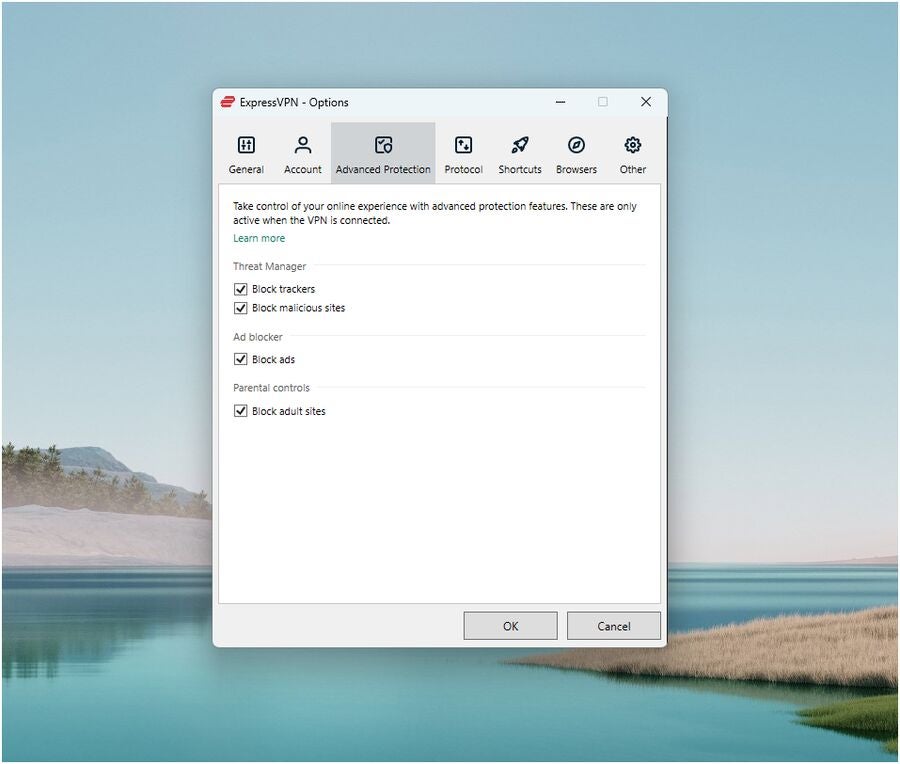
Both NordVPN and ExpressVPN offer password managers with their subscriptions — NordPass and ExpressVPN Keys. Keep in mind, however, that NordPass is only bundled with NordVPN Plus and above, while Keys is included in all ExpressVPN plans.
SEE: Best VPNs for streaming, gaming, torrenting (TechRepublic Forums)
All in all, NordVPN gets my vote for having a bit more in the way of extra features compared to ExpressVPN. Personally, I appreciate how most of Nord’s additional features are all focused on security and privacy. This makes their service even more compelling as a convenient security solution and not just an ordinary VPN.
Performance and speed
Winner: ExpressVPN
For performance, I give ExpressVPN the round by a slim margin. Both NordVPN and ExpressVPN gave me fast, and reliable VPN speeds during my period of testing. Websites loaded quickly, and I had zero noticeable drops in connection while connected to servers from each.
During testing, I connected my work laptop to one of their VPN servers and did my usual work as a writer. This involved having multiple tabs open for research, downloading, and uploading files, attending online video meetings, and streaming music in the background.
Where ExpressVPN gained an advantage is speed test results. With NordVPN, it actually had a 0.78% increase in downloads compared to my internet service provider — which is excellent. However, its upload speed performance was less impressive, recording a 44% decrease in comparison to my ISP.
SEE: Why Your Business Needs Cybersecurity Awareness Training (TechRepublic Premium)
On the other hand, ExpressVPN recorded consistently faster speeds in both results. For downloads, it only had a 25.65% decrease compared to my home network. For uploads, it recorded 0.37% faster speeds against my ISP connection. With these results, ExpressVPN shows it can offer fast performance in both downloads and uploads.
In my opinion, most users will be perfectly satisfied with either NordVPN or ExpressVPN. I got great speeds with both in day-to-day use. But if you’re specifically after which VPN brings better performance, my testing showed ExpressVPN is the better pick.
Ease of use and design
Winner: ExpressVPN
When it comes to overall user experience, my vote goes to ExpressVPN. It has, perhaps, one of the best VPN applications I’ve used so far.
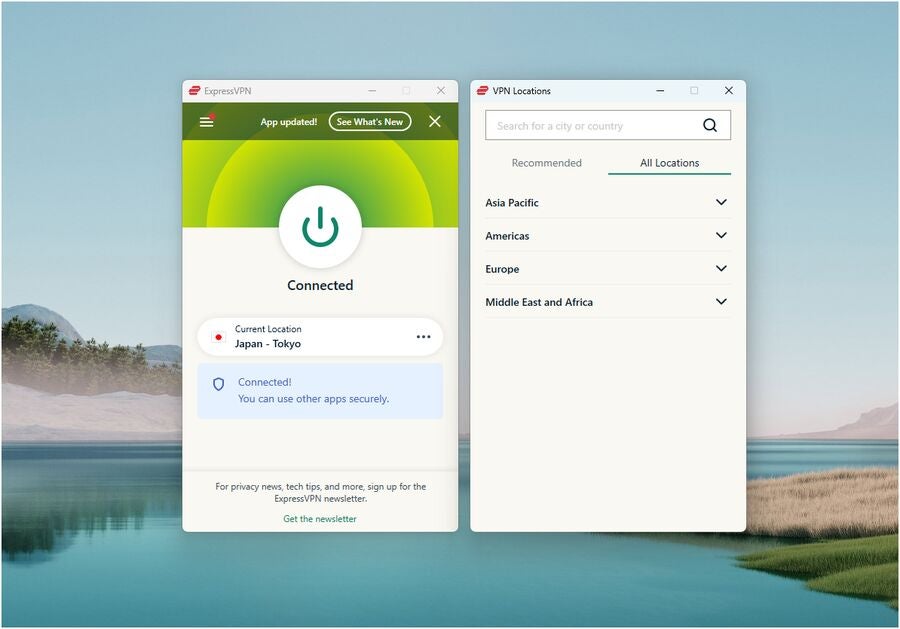
It comes with a simple and modern design that helps make the interface user-friendly and easy to use. I particularly like how everything is clearly laid out — it has a big power button as an On/Off switch; a well-organized server list categorized by regions; and an equally intuitive browser extension that works as a VPN remote control.
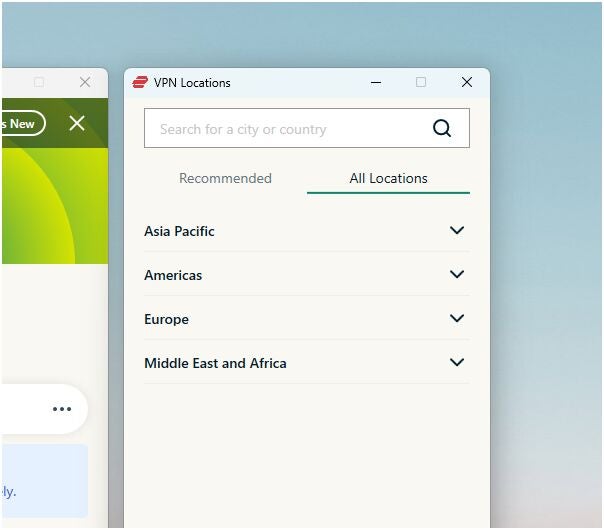
On the flipside, NordVPN implements a solid interface as well. It uses a sleek design and does a good job of organizing all of its features into a single hub.
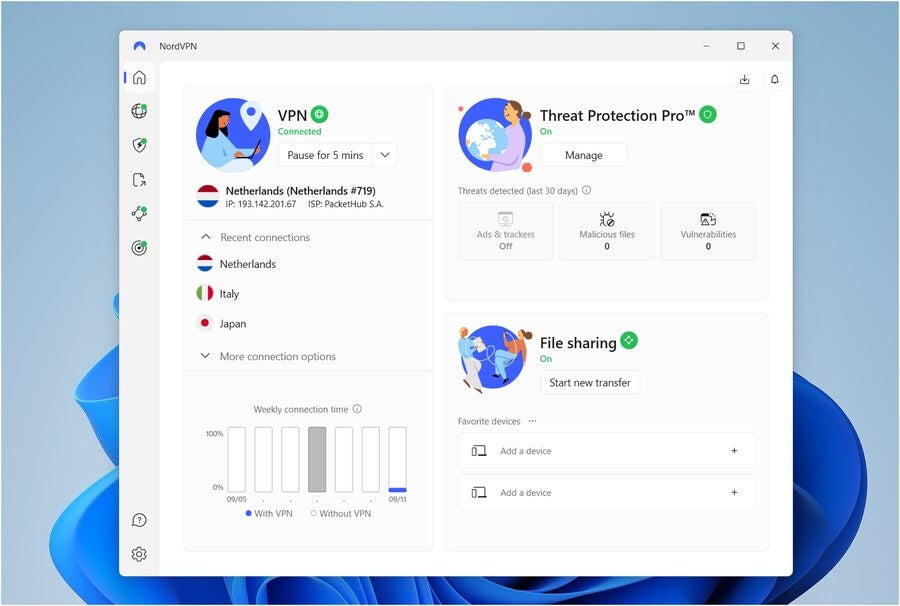
While I also like NordVPN’s VPN app, I feel it’s a tad overwhelming at the start. There’s a ton of features you’re encouraged to turn on, and the server list is less accessible upon setup compared to ExpressVPN. This can make it a bit intimidating for less tech savvy users that aren’t used to tinkering with software.
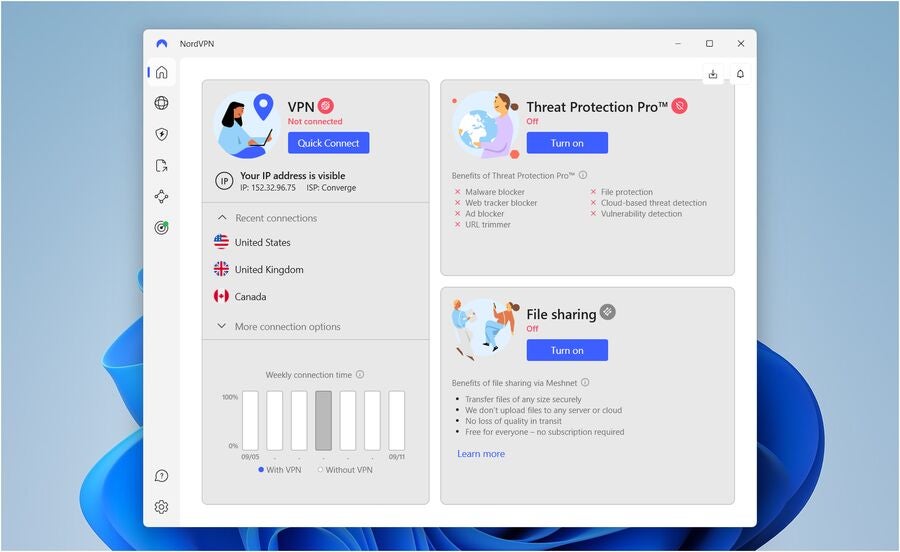
Fortunately, once you give each section of NordVPN a try, you actually realize that it does a great job of keeping its abundance of features organized and tidy. That being said, if having an easy-to-use and modern-looking VPN app is a priority, I recommend going for ExpressVPN.
Value
Winner: NordVPN
For value, NordVPN gets the win for me. This is due in large part to NordVPN having more subscription options and a more affordable starting price.
If we’re to compare each VPN’s base one-year subscriptions, NordVPN Basic at $4.99 per month is around $2 cheaper than ExpressVPN’s one-year plan at $6.67 per month.
Moving up a tier, NordVPN’s Plus one-year plan with extra security features is still more affordable — priced at $5.99 per month compared to the same $6.67 ExpressVPN plan.
I also appreciate the fact that NordVPN provides longer, two-year subscriptions, which bring the monthly fee down to $3 to $6 per month. While I like ExpressVPN’s straightforward subscription plans, I hope they offer longer contract options like this for longtime customers that want to get some savings.
Simultaneous device connections
Winner: NordVPN
In terms of device connections, I give it to NordVPN. Right now, NordVPN allows for up to 10 devices to be simultaneously connected to its VPN servers. In comparison, ExpressVPN covers up to eight simultaneous device connections.
To be fair, the difference between eight and 10 is small, and I feel both device limits are enough for most users. However, it’s important to keep in mind NordVPN’s more affordable pricing and larger server suite.
Having more device connections adds another layer of value with NordVPN’s service compared to ExpressVPN. The larger device limit can also prove important for small teams or startups that plan on sharing a subscription amongst each other.
NordVPN vs ExpressVPN on Reddit
When looking at Reddit discussions talking about which VPN is better, it’s clear that NordVPN and ExpressVPN are fairly evenly matched.
According to a Reddit user in the VPNAdvice community, “Nord’s been hella reliable so far. Been using it for a year now and the dedicated IP has made things so much better since its way faster than using a shared IP.” In the same community, another Reddit user said this about ExpressVPN: “Despite the higher price, I wouldn’t switch from ExpressVPN to another service.”
However, if we take a look at threads asking about the best VPNs, it seems that NordVPN is mentioned more times than ExpressVPN.
One Reddit user in the VPNOverview community said, “I’ve used a bunch of VPNs like Surfshark, CyberGhost, and NordVPN. NordVPN is my favorite. It blocks lots of overseas stuff I stream, and several family members use it too. It’s super trustworthy and costs only $3.50 a month. Just my two cents.”
Two providers frequently also mentioned alongside NordVPN and ExpressVPN are Surfshark and Proton VPN. These are worthy alternatives as well, and I encourage you to check out our Surfshark review and Proton VPN review.
NordVPN pros and cons
Pros
- Offers around 6,200+ servers in 111 countries.
- Meshnet encrypted file-sharing system.
- Threat Protection Pro against malware, ads, and trackers.
- Independently audited no-logs policy.
- Fast VPN speeds.
- 7-day trial via the Android app.
- Double VPN and obfuscated servers.
Cons
- No free version.
- Can be intimidating at first.
ExpressVPN pros and cons
Pros
- Servers spread across 105 countries.
- 18 independent audits for its services and apps.
- Easy-to-use, well-designed app interface.
- Fast speeds and performance.
- Advanced Protection against ads and trackers.
- Parental controls against adult sites.
Cons
- More expensive.
- Free trial is mobile only.
- Lacks more affordable, 2-year subscription.
Should your organization use NordVPN or ExpressVPN?
After a tough matchup, NordVPN comes out on top over ExpressVPN. Its wide server network, top-tier security capabilities, and fast VPN speeds make it one of the best VPN services available.
When compared to ExpressVPN, NordVPN also gains an advantage with its more affordable pricing, variety of subscription options, and slightly more generous simultaneous device connections.
I personally like NordVPN’s strong focus on privacy and security, making it a really good security solution alongside its main VPN functionality. I feel NordVPN is best for most users, especially those that want an all-around VPN with fast performance and a number of additional features.
On the other hand, ExpressVPN is a great choice if you value having a well-designed VPN app and reliably fast speeds. ExpressVPN is also my top recommendation if consistent, third-party audits are important to you.
Methodology
My head-to-head comparison of NordVPN and ExpressVPN involved an in-depth analysis of both VPNs’ features, real-world performance, and value.
To assess each VPN, both services were scored on everything from their server networks to their pricing. In particular, I took into account five main pillars, each having corresponding weights:
- Pricing (20%).
- Core VPN features (30%).
- Ease of use (15%).
- Customer support (30%).
- Expert analysis (5%).
I also looked into real user testimonials and reputable reviews to round out my final recommendations for both NordVPN and ExpressVPN.
For speed and performance, I tested both VPNs on my personal Windows computer and ran them through Ookla’s public Speedtest. Finally, I considered which types of businesses or individual users would best benefit from either NordVPN or ExpressVPN.

